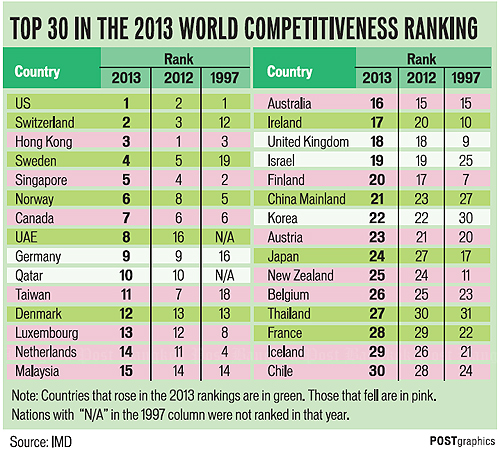
The US has regained the top spot in global competitiveness as ranked by the Swiss IMD's survey of 60 economies.
The top 10 economies by competitiveness in 2013 are the US, Switzerland, Hong Kong, Sweden, Singapore, Norway, Canada, the UAE, Germany and Qatar.
Thailand rose to 27th from 30th last year, placing third among Asean countries behind Singapore and 15th-ranked Malaysia.
To improve its ranking, Thailand should execute national strategies, speed up the 2-trillion-baht megaprojects, boost national energy security and promote renewable energy, prepare and upgrade the capacity of small and medium-sized enterprises (SMEs) for Asean integration and implement public- and private-sector commitment to eradicate corruption, said the IMD report.
The US seized the top spot from Hong Kong on the strength of a financial sector rebound and technological innovation, said IMD, a business school in Lausanne.
Together with Singapore and Canada, the US has demonstrated a stable and enduring model that relies on long-term advantages like technology, education and advanced infrastructure.
Switzerland, Sweden and Germany share a recipe for success _ exports, manufacturing, diversification, competitive small businesses and budget discipline.
In Asia, China climbed to 21st place from 23rd last. Its success has had a knock-on effect in the region, prompting many Asian economies to redirect exports away from the US and Europe and towards other emerging markets.
Europe mostly fell, with Britain and France losing their dominant positions and competitive clout. Southern Europe including Italy, Spain, Portugal and Greece lagged behind. IMD said those countries failed to diversify their industry enough or control public spending and now face austerity programmes.
Meanwhile, Latin America has been challenged in many aspects by emerging Asian nations such as Thailand.
"While the euro zone remains stalled, the robust comeback of the US and better news from Japan have revived the austerity debate," said Stephane Garelli, head of the IMD World Competitiveness Center.
"Structural reforms are unavoidable, but growth remains a prerequisite for competitiveness," he said.
"In the end, the golden rules of competitiveness are simple _ manufacture, diversify, export, invest in infrastructure, educate, support SMEs, enforce fiscal discipline and, above all, maintain social cohesion."

